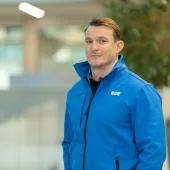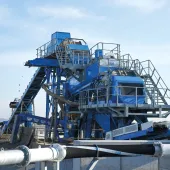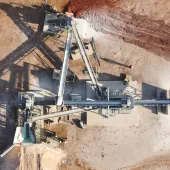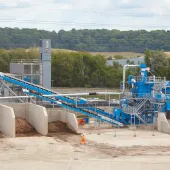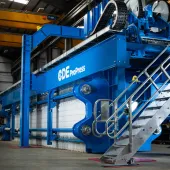New CDE plant for D’Arcy Sands

First published in the July 2019 issue of Quarry Management
One hundred percent increase in production set to support company in fulfilling new Aviva Stadium contract
At their Wexford site, near the village of Blackwater, D’Arcy Sands were facing a combination of site-specific challenges, namely water supply and reliance on a traditional bucket-wheel classifying system. The company recently partnered with specialist wet-processing equipment manufacturers CDE to commission a new wet-processing plant which was recently showcased at Open Day events on 25–26 June.
With operations in counties Wexford and Wicklow, the company, owned by father and son business duo Anthony and Tony D’Arcy, has been producing high-quality building materials and sports sands for more than 25 years.
The company specializes in the production of quality graded sands for a range of sports, including outdoor, synthetic and all-weather sports pitches; sands for golf courses, including bunkers and top dressing for greens and fairways; and its silica sands are also used widely in equestrian sports for training surfaces and racetracks.
Over the years, D’Arcy Sands have worked with clients throughout the UK and Ireland, supplying sands for major projects and events including the Dubai Duty Free Irish Open, Croke Park, Thomond Park, Curragh Racecourse, and Adare Manor Hotel Resort.
Recently, the company secured a contract to supply its sands to the Aviva Stadium.
The challenge
D’Arcy Sands produce high-spec sports sands for some of the most prestigious venues and events in the UK and Ireland. It is, therefore, important that the quality and prestige of these projects is reflected in the standard of their products.
Until their new CDE plant was commissioned, D’Arcy Sands had been using a tracked rinser and traditional bucket-wheel system for sand classification and dewatering.
An upgrade of the existing bucket-wheel system was required to tackle the loss of valuable materials to the ponds and excess moisture in the final products.
Water availability proved to be another significant challenge at the company’s Wexford site, so much so that it was transporting its sports sand more than nine miles to a separate site with sufficient water supply.
As well as water management, Tony D’Arcy, manager at D’Arcy Sands, said energy efficiency was another important consideration.
‘The plant we had been operating was powered by a diesel-hydraulic system, so there existed the potential for spillages that could contaminate our much-sought-after sports sands. We work with world-class venues and arenas, so we wanted to take preventative measures and put in place a system that would remove the risk of product being rejected or returned.’
Garry Stewart, area business development Manager at CDE, explained how the new plant was developed using CDE’s co-creation approach.
‘Our engineers worked closely with Tony and the team at D’Arcy Sands throughout the design and commissioning process, to better understand what the company wanted to achieve by upgrading its plant and to outline any key site challenges they were facing.
‘Completed over several site visits and through a series of collaborative design workshops, we designed a bespoke plant specific to D’Arcy Sands to help the company to scale its operations and extract maximum value from the material being processed.’
Tony D’Arcy said: ‘We wanted to partner with a company that could help us realize our growth ambitions by designing a solution that supported our objectives in the most sustainable and economic way possible. Plant build quality coupled the technical know-how and the expertise of their engineers proved CDE were the ideal fit to deliver on our aims.’
The solution
After careful consideration of the site and customer’s requirements, CDE presented a custom-built plant featuring the electric-powered M2500 E4 washing plant with integrated hopper, feed conveyor and twin-deck Infinity P2-75 screen. The plant also includes an integrated water-management system comprising an A200 AquaCycle thickener, FlocStation polymer-dosing plant and AquaStore water tank.
CDE’s M2500 fully integrated modular washing plant combines feeding, screening, sand washing and stockpiling into one compact and mobile chassis. The E4 model was selected as would allow D’Arcy Sands to produce up to four commercial-grade washed sand and aggregate products simultaneously.
Importantly for D’Arcy Sands, the M2500 is a maintenance-free and energy-efficient all-electric-drive operation. Unlike their former diesel-hydraulic system, this eliminates the possibility of product becoming contaminated by spillages.
To improve the efficiency of the company’s day-to-day operations, the new plant incorporates CDE’s cutting-edge water-management system, the AquaCycle thickener.
Waste water from the plant is processed by the AquaCycle thickener which recovers up to 90% of the process water for recirculation back into the washing plant. This ensures the moisture content of D’Arcy Sands’ product is reduced from more than 20% per cent to an average of 10–15%, resulting in a much faster return on investment.
It also means that, for the first time, the company can process material at the extraction site.
The entire system requires less than 20m3 of water per hour to operate – a 90% reduction from the 200m3 of water required for its former plant.
Garry Stewart said: ‘By introducing the CDE AquaCycle, D’Arcy Sands are now able to wash material at their Blackwater site. It’s the custom-built solution designed by CDE that has made this possible for Tony and his team. This was unachievable with the old plant.’
The results
‘We’ve doubled production as a result of the new CDE wet-processing plant,’ Tony D’Arcy explained.
Raw feed material, primarily Wexford sports sand with a small portion of gravel, is being fed into the new plant at a rate of up to 80 tonnes/h.
‘Output is up by more than 100%,’ he said. ‘We’re now processing up to 80 tonnes/h of feed and extracting over 40 tonnes of our quality graded sports sands. Greater control of fines separation using cyclone technology, which is a new development for our operation, has added more value to our products and is driving significant demand.
‘The feedback we have been getting from our customers, and in particular the greenkeepers who use our sand daily, has been excellent with numerous positive comments on the quality, percolation and workability of the sand.
‘Importantly for us, the new system allows us to wash material at our Blackwater site when previously we had to transport it off site almost 10 miles to a location with a better water supply.’
AquaCycle technology is helping D’Arcy Sands to recycle 90% of their process water and requires a small 20m³ per hour top-up supply, which is drawn from a bore well on site.
Inefficiencies in their traditional bucket-wheel systems resulted in D’Arcy Sands losing high-value resources to the pond, as Tony D’Arcy explained: ‘Our new system is recovering this resource and helping us to maintain high product output for our premium sands.’
Also, more effective screening made possible by the M2500, which screens and washes up to four in-spec sand and aggregate products in one process, is opening up new markets and opportunities for D’Arcy Sands.
Mr D’Arcy continued: ‘Producing commercial-grade sports sands has always been the primary focus for D’Arcy Sands, but the new plant is producing new revenue streams for us through the production of higher-quality aggregates and opening up new markets.’
Confident in the quality of their commercial-grade sports sands and aggregates, and coupled with growing demand as a result, the company has purchased adjoining land at its Blackwater site to increase the lifespan of the operation.
Garry Stewart added: ‘D’Arcy Sands are ready for the future. They have put in place a solid foundation following the purchase of additional land to extend the life of their Blackwater site. This ensures the company has a good source of material to process with the best possible equipment and access to the right knowledge to achieve their growth ambitions.’
Project facts and figures
- Wet-processing plant energy requirements easily met by 250kVA generator on site
- Water consumption reduced from 200m3 to 20m3 per hour
- Tonnage processed increased from 30–40 tonnes/h to 80 tonnes/h
- Tonnage output increased from 15–20 tonnes/h to 40 tonnes/h
- Subscribe to Quarry Management, the monthly journal for the mineral products industry, to read articles before they appear on Agg-Net.com



